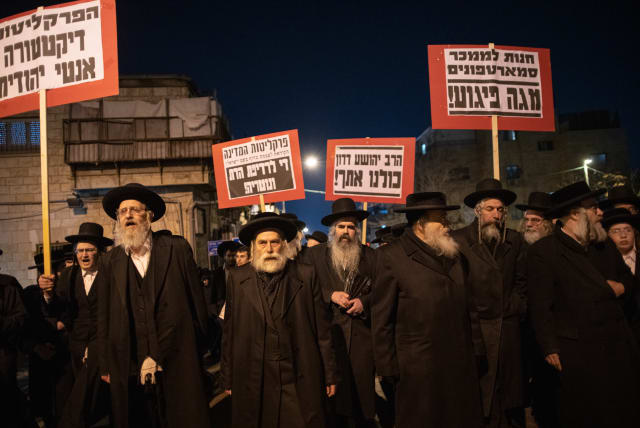Do ultra-Orthodox sages want civil war?

MIDDLE ISRAEL: The anti-judicial assault's most quiet actor is also its most vulnerable part.
Asked to address an audience at the President’s Residence last week about what I call the “Jewish march of folly,” I briefly surveyed ancient Israel’s civil wars and their catastrophic results, compared and contrasted them with Israeli history, and then stared at my text’s closing lines, which addressed our current crisis.
Specifically, I was going to address what in my view is the anti-judicial assault’s most quiet, and yet most effective engine, and its relationship with our ancestors’ civil wars. However, with President Isaac Herzog and Supreme Court President Esther Hayut facing me, I figured the venue was inappropriate for that and decided to skip those lines, ending instead by restating my support (“Who wants civil war?” January 27) for the presidential effort to inspire a judicial reform by consensus.
This venue, however, is not inappropriate for saying what might have pooped a distinguished host’s party. In fact, pooping parties is part of what we columnists are meant to do – so here are those unread lines.
A crucial actor in the crisis
PRESIDENT HERZOG’S mediation focuses on both sides’ politicians, as it should. However, there is one more actor in this crisis, a crucial actor that no one engages or discusses, not because it’s irrelevant but because it’s inaccessible.
That actor is the three councils of sages that shape the ultra-Orthodox political agenda, which includes the effort to bring the Zionist enterprise’s judiciary down on its knees.
Ultra-Orthodoxy’s rabbis do not dialogue with the rest of the tribes of Israel, certainly not with the media, yet they hold one of the keys for dismantling the bomb that has come to tick in our midst. Bringing them into the presidential search for consensus is thus crucial, and the question, therefore, is what to tell them should such a dialogue commence.
Before that, the question is what not to bring up in such a dialogue, and the answer is that this will not be the time to raise the rest of Israel’s regular grievances concerning ultra-Orthodoxy’s relationship with the Jewish state.
What we shouldn't say
This will not be the appropriate venue for telling those sages, for instance, that their flock is a reincarnation of the biblical “clans of Reuben” who chose to “stay among the sheepfolds” and “pipe for the flocks” while their brethren fought a war of defense, as Deborah the prophetess ridiculed them (Judges 5:16).
This will also not be the venue in which to ask ultra-Orthodoxy’s rabbis who comes to their mind when they read Isaiah’s diatribe, “Your rulers are rogues and cronies of thieves… avid for presents and greedy for gifts” (Isaiah 1:23).
This will also not be the time to ask the ultra-Orthodox sages what Micah meant when he scolded “the rulers of the house of Jacob” and the “chiefs of the house of Israel” who “detest justice” and “build Zion with crime” and “make crooked all that is straight” (Micah 3:9-10).
This will also not be the right time to offer ultra-Orthodoxy’s navigators a tour of one of our universities so they will hear several random lectures in, say, philosophy, law, agriculture, medicine, social work and nursing, and then tell us whether they still think, as one of their leaders once told David Ben-Gurion, that ours is an “empty wagon.”
What then will we tell our ultra-Orthodox brethren should the judicial crisis they spawned trigger a dialogue with their spiritual leaders? Well, we should tell them they are torching war, and not just war, but a civil war, the first Jewish civil war since the one that ended in Jerusalem’s destruction.
TORCHING WAR among the Jews is catastrophic regardless of specifics, but in this case, should you achieve your aim and end up appointing the judges who will grant you the tribal privileges you seek – you will later learn you have severed your ties with the rest of the Jewish people, including those you think are your allies.
If you manage to force the court to abandon the principle of equality before the law, and if you manage to twist the law so your children’s non-service becomes a constitutional right, millions will see in you the revivers of the tribalism and separatism that led the biblical kingdom of Israel to schism, fratricide and extinction.
Millions will conclude that, after the earlier ultra-Orthodox rabbis’ war on Theodor Herzl and his gospel, you are now out to destroy the Zionist enterprise from within; to ravish the queen in the king’s palace; to restore the ghetto walls that our founding fathers set out to break and use them to circle the Jewish state.
That is why the fire you are playing with is an alien fire, the fire of civil war – a civil war in which your flock will be the most opportune, the most natural, and the most vulnerable target.
Your councils’ two greatest authorities – the late Eliezer Menachem Shach and Ovadiah Yosef – ruled that relinquishing land for peace was permissible because it was a matter of pikuach nefesh (Jewish law’s principle that saving lives overrides all other commandments and prohibitions, except murder, idolatry and adultery).
Is war with Jews pikuach nefesh?
The question we therefore ask you is this: War with the Arabs is pikuach nefesh and war with the Jews is not?
If anyone manages to dialogue with the sages of ultra-Orthodox separatism and explain to them where their current effort might lead, maybe they will be persuaded to rule that civil war is pikuach nefesh, and thus overrides their war on the Zionist court.
Should that happen, the crisis where we have arrived will end before, rather than after, blood is shed – and in fact will see ultra-Orthodoxy, for the first time in its history, joining the Zionist quest, effort and resolve to put an end to the Jewish march of folly.
www.MiddleIsrael.net
The writer, a Hartman Institute fellow, is the author of the bestselling Mitzad Ha’ivelet Ha’yehudi (The Jewish March of Folly, Yediot Sefarim, 2019), a revisionist history of the Jewish people’s political leadership.
Jerusalem Post Store
`; document.getElementById("linkPremium").innerHTML = cont; var divWithLink = document.getElementById("premium-link"); if (divWithLink !== null && divWithLink !== 'undefined') { divWithLink.style.border = "solid 1px #cb0f3e"; divWithLink.style.textAlign = "center"; divWithLink.style.marginBottom = "15px"; divWithLink.style.marginTop = "15px"; divWithLink.style.width = "100%"; divWithLink.style.backgroundColor = "#122952"; divWithLink.style.color = "#ffffff"; divWithLink.style.lineHeight = "1.5"; } } (function (v, i) { });

